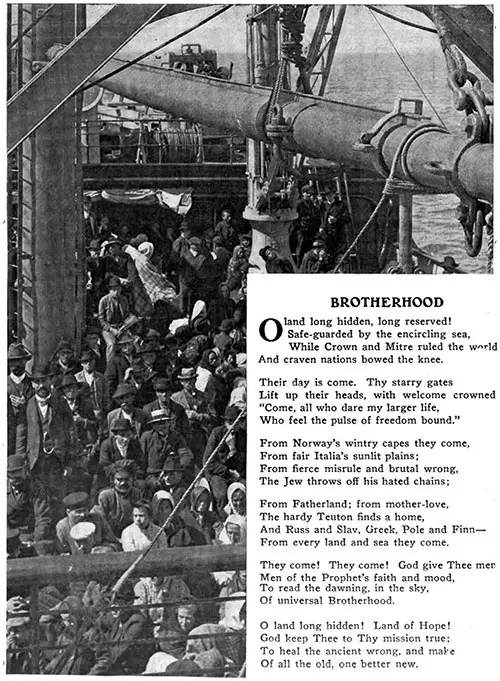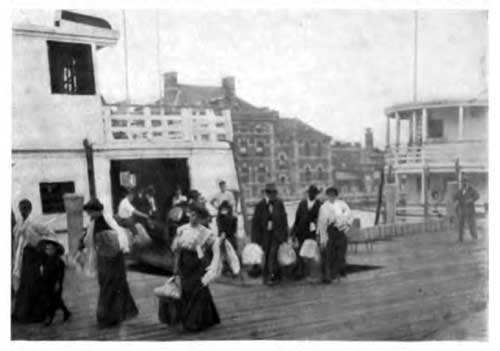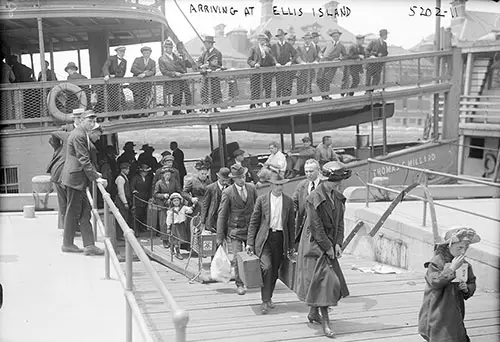Government To Find Work For All Immigrants

Brotherhood Poem - O Land Long Hidden! Land of Hope! The Home Missionary, October 1907. GGA Image ID # 154af779af
THE greatest employment agency in the world has been newly established at Washington. It is conducted by the government, and its business will be to find work for everybody. Jobs for over a million immigrants from foreign lands have to be obtained somehow every year, and Uncle Sam proposes to take general charge of this enormous task.
But, in addition, great numbers of native-born American citizens are in want of suitable or permanent occupation, and in their behalf the Federal organization intends to make use of all its vast facilities, with a view to enabling them to earn a satisfactory allowance of bread and butter.
It is very desirable to find something for the foreigner to do—to get him away from the large centers of population, where he has a tendency to stagnate and form colonies with others of his kind, and to ship him off to some place where his labor is really wanted, and where he will have a chance to live and to bring up his children under favorable conditions.

In a big city he dwells in a slum and is liable to be a nuisance, if not a menace. Provided with means of earning a livelihood decently elsewhere, he will in most instances become a useful citizen.
To accomplish this very purpose the division of information, as the new-fledged employment agency is called, has been established, as a branch of the bureau of immigration. But, as above indicated, its facilities will be used also to help native-born Americans. The Southern states, for example, need labor, and there has been a strong movement in favor of turning the stream of aliens in that direction.
But a more mature consideration of the subject has 'brought conviction that it would be much more desirable to send to that part of the country the Americans who are to be found at the present time in Multitudes elsewhere, looking for a job.
It is a fact that all over the Northern and Eastern sections of the United States 'there is a growing tendency to discharge men who have reached. thirty-five or :forty years of age, on tie ground that they are too old to furnish the most efficient service. The railroads will not employ them, and industrial concerns generally seem to be falling into tell e same view.
Thus it comes about that there are at the present time great numbers of men in the prime of life, most of them with families of young children, who, though anxious to work, are out of employment. They could find the work they want in the South —a section where labor of all kinds is in great demand, and where they could live more comfortably at less expense.
Now, it is one thing to publish statements of this kind as facts, and quite another to convey the information to those who want it in such shape that they shall be able to utilize it to advantage. In order to make it available in a practical way, the bureau of information has started in to establish permanent stations in all of the big cities, each of which will be in effect an employment agency organized on a highly systematic basis.
Such a station has. already been opened in New York, and others will soon be in operation in Chicago and at other points. They will devote themselves exclusively to the business of finding work for anybody, of either sex, who wants to get it, whether, alien or native-born American.
The name division of. information, given to the office at Washington,. is appropriate because the concern devotes its whole attention to the gathering and distribution of knowledge in regard to matters relating to employment. It has put itself into communication with employers of labor of every kind all over the country.
Industrial organizations and associations of agriculturists have been asked to furnish data in regard to local demands for artisans, farm laborers, and work-people in every line of activity. Blanks have been sent to thousands of postmasters, to be filled out, and letters have been exchanged even with individual farmers in many sections.
The idea in view is to get together every scrap of obtainable information in regard to the kind of labor that is wanted in each state, county, and township in the Union. All over the United States the department of agriculture has county and township correspondents, every one of whom has been required by a special order to furnish facts of the sort. All of the data secured are carefully tabulated, and before long will be made readily available for instant reference at the "stations" in New York and other cities by recording them upon indexed cards.
Thus anybody who happens to apply at one of the stations for information in regard to the labor demand in any township or county can get it at a moment's notice, together with a comprehensive statement in regard to wages offered, schooling and other opportunities available, character of soil and climate, etc, there being no omission even of the number of people in the neighborhood who are able to speak the language of the applicant — this last being often a matter of no small importance, inasmuch as the average foreigner is naturally disinclined to go to a place where he cannot make himself understood without the aid of an interpreter.
If it be desired on the one hand to make such information accessible to persons wanting employment, it is considered equally important to acquaint employers of labor everywhere with the means whereby they may secure the services they require.
Acting as a medium of communication between the labor-requiring employer and the man or woman who is anxious for work to do, the division of information aims simply to bring the two together.
This it is able to accomplish through the extraordinary facilities it. commands for the gathering and. dissemination of data of the kind described. So great is the present demand for labor not only in the South, but in many other parts of the country, notwithstanding the temporary industrial depression, that literally floods of letters have been pouring in, conveying inquiries in regard to means whereby work people for the farm, for the factory, for the mines, for the railroads, and for all sorts of other human activities, can be secured.
So eager is this demand that would-be employers are not only frequently, but quite commonly willing to pay travelling expenses as an advance of wages. When a man is really in need of a job, he is not likely to have the money to buy a railroad ticket for a long distance. But in such a case the government completes the negotiation by furnishing a species of guarantee.
That is to say, it puts the man or woman on a train, bound for the proper destination, and insures his arrival by checking his or her baggage direct to the employer, forwarding the check to the latter by mail.
Thus the employer has reason to be satisfied that the person he proposes to hire will actually come to hand—else he might be "one' the travel money furnished. And, in the case of an alien, careful instructions are given to the conductor to see that he is put off at the proper place, a pasteboard tag with name and address being fastened to his coat.
The plan of distributing printed literature in various languages among immigrants on their arrival in this country has not been found successful. Such literature was intended to instruct them in regard to opportunities of employment offering in various parts of the United States, the best means of transportation, and so forth.
But experience has shown that they do not absorb suggestions conveyed in this manner. The average alien, when he arrives at an American port, is hurried, anxious, more or less upset in mind, and above all fearful lest he be deported—that is to say, sent back to the place he came from. This last idea in particular obsesses him, because he has heard that such things often happen.
Accordingly, his one idea is to get away from the immigration depot, and incidentally, in nine cases out of ten, he throws away the literature which might be of so much use to him if lie took the trouble to peruse it carefully.
This unfortunate alien—more than a million of him, his wife, and his children arrive every year—has a notion that he will find work off-hand. Sometimes he does, but in a large percentage of instances, after he has been in this country for a couple of weeks, he is still without employment, and the few dollars he had in his pocket when he came have been spent.
This is the time when he needs help most, and when he is in an attitude, so to speak, to receive it. If he learns that an employment agency, maintained by the government, will find work for him, he is glad enough to seek its kindly offices.
Here is where the local "station" of the division of information comes in. He applies there, and finds that there is employment for him obtainable in many places. He is at liberty to make his own choice. He registers his name and address. There is no fee demanded.
He states the kind of work he has been accustomed to do in his native land, and mentions the number of persons composing his family, including the ages of his children. All of this goes down upon an official blank and becomes part of the records of the station.
At the present time, in New York, men in want of work, citizens as well as foreigners, are crowding into the government station by hundreds daily, putting down their names and addresses.

In the countries from which they collie most of the aliens—in fact, a great majority. of them—were tillers of the soil. On reaching the United States they engage themselves for labor in sweatshops, in the mines, in factories, and at digging on the railroads. Seems rather odd, does it not ?
Also, one may say that it is very unfortunate, not only for themselves, but also for the commonwealth to which they have become recruits. Such occupations do not offer by any means the best advantages for them, and when, as commonly happens, they remain in the cities, they usually assemble in slum colonies, toiling for an Insufficient wage, and too often contributing to the volume of crime.
Now, why should this be so? One reason, undoubtedly, is that this country has never been represented to arriving aliens as anything but a huge workshop. It hardly occurs to them to imagine that there is such a thing as agriculture on this side of the water. If they only knew the way to manage it, they would far rather till the land than dwell in sickly slums and sew on interminable "pants."
Taking which for granted, the government proposes to find employment for as many of them as possible at farming and in allied pursuits—to distribute them over the country, get them away from the centers of population, and give them a chance to become really useful citizens. Then they will write back home about the agricultural opportunities of the United States, and those who come after them will seek the same kind of healthful activities.
The division of information at Washington is nothing more than a central administrative office. It will exercise its useful functions through its "stations" in great cities. At every one of these stations information will be accessible, whether to native or foreigner, in regard to labor opportunities in every county and township of the Union.
Maps, on a large scale, will be kept on hand, in such shape that a person desiring employment, after picking out the exact locality to which he thinks he would like to go, will be able to find out exactly what his geographical situation would be the accompanying reference cards giving all the details he wants in regard to the climate, the soil, the people in the neighborhood, the churches and schools, and the social and other advantages offered.
Not long ago the state of California reported officially to the division of information that it could furnish employment for a million men. This was very agreeable news, so far as it went, but it did not serve the purpose. It was not sufficiently definite.
What the government wants is details, and these must be exceedingly exact. If, instead of a million, the report had stated that one man was wanted, then the California authorities would have been requested to state the purpose for which that man was desired, where he was to go to work, whom he was to work for, what iris wages were to be, and a lot of other things.
It has been already stated that many employers are glad to furnish transportation as an advance of wages. Where agricultural labor is wanted, the inducements offered are in numerous instances much greater.
In the South, for example, there are a great many owners of plantations who are willing to give, in addition to travel money. a house to live in, a cow for milk, an assortment of implements, and even food supplies for a considerable term—with a further proffer of a half share in the proceeds of the crop!
A chance of that sort seems gilt-edged indeed from the point of view of a man adrift in a big town, with a family on his hands perhaps, and no means of immediate support. At the same time, it is easily to be realized that, unless proper precautions were taken, people anxious for work might be shipped off to places where disappointment in the character of employment, or in the reliability of wages to be paid, would render their condition worse for the change instead of better.
Against such possibilities, however, the government insures the applicant for labor by demanding in each case two satisfactory references, which are carefully verified. Furthermore, the would-be employer is obliged to fill out a comprehensive blank, stating the duties demanded, the hours per day of service, the wages to be given, and quite a number of other points, even including the prospect, if any, that the services, of the wife will be utilized and paid for.
All of this work has been organized and is being conducted by Terrence V. Powderly, who made a reputation as a labor leader long before he accepted employment under the government. He is a remarkable man—about- fifty-eight years old, with hair and moustache perfectly white, a pink skin that any young girl might envy, a keen eye, and a manner that full of energy.
At the present time he is expanding the idea of the government employment bureau in every possible way, with a view to making it a thoroughly efficient organization for the benefit of everybody who wants work to do; and one of his projects, incidentally contemplated, is eventually to put agents of the division of information on board of every steamship carrying immigrants from Europe to this country, in order to teach these people before they arrive something of what they ought to know about the great country in which they are going to dwell and seek a livelihood.
Bache, Rene, "Government To Find Work For All," in The Technical World Magazine, Volume IX, No. 3, May 1908
